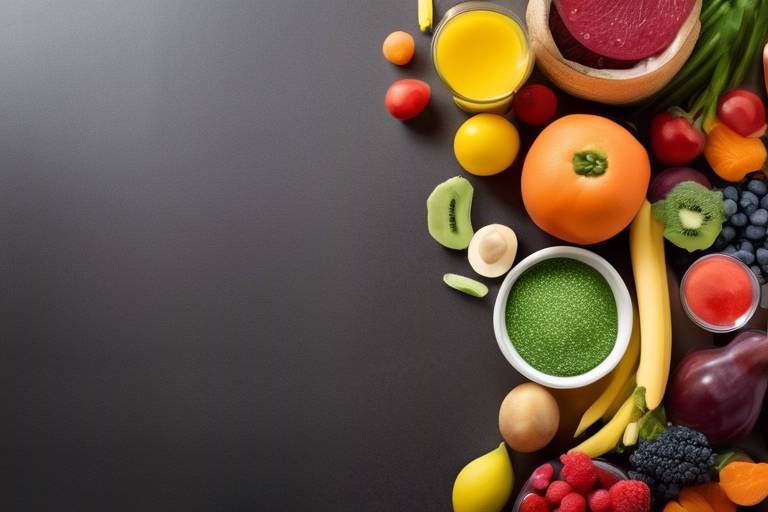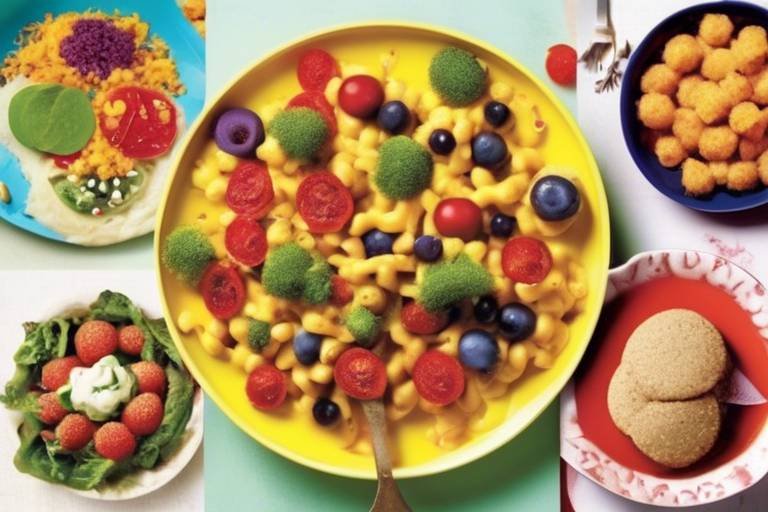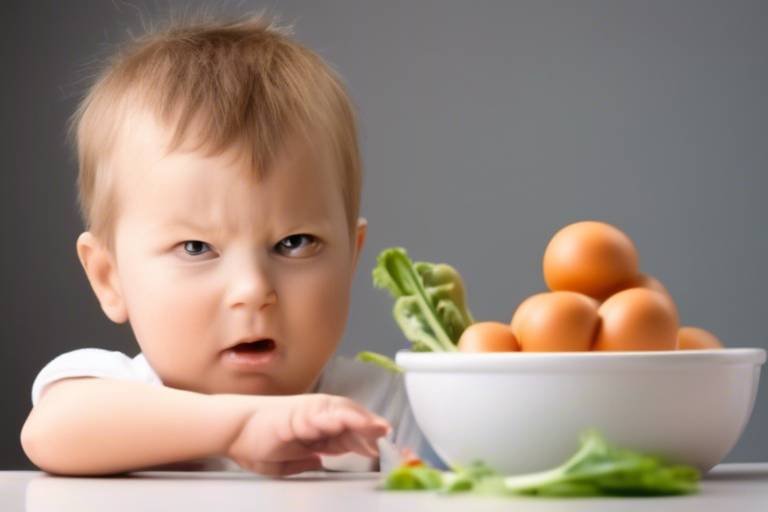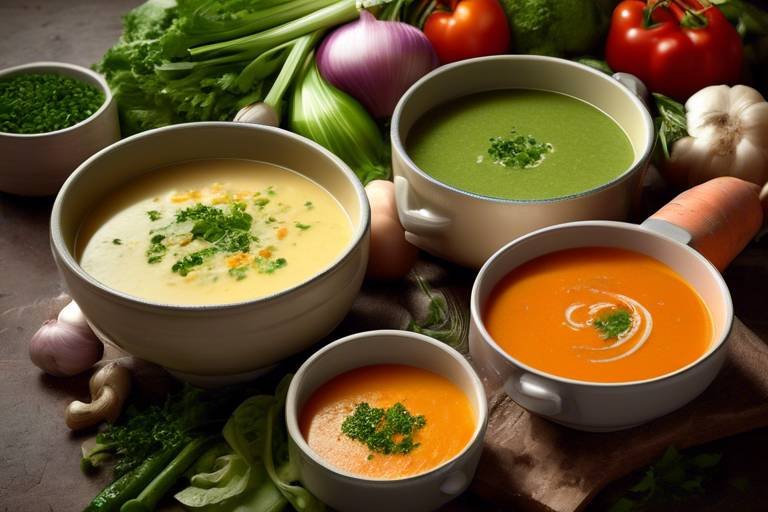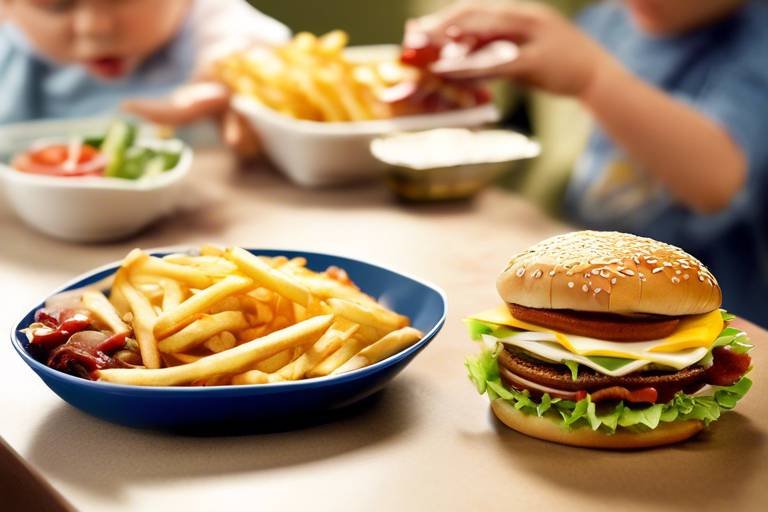What Nutrients Do My Kids Need and Where Can They Get Them?
As a parent, you might often find yourself wondering, what exactly do my kids need to grow healthy and strong? It's a common concern, and the good news is that understanding the essential nutrients for your children’s growth and development can make all the difference. Just like a car needs fuel to run smoothly, your kids need a balanced diet filled with the right nutrients to thrive. These nutrients include vitamins, minerals, proteins, fats, and carbohydrates. Each plays a unique role in ensuring your little ones have the energy they need for play, learning, and growth.
To help you navigate this journey, let’s dive into the specifics of what nutrients are crucial for your children and where they can be found. Think of it as a treasure map leading to the best food sources! By the end of this article, you'll be equipped with all the information you need to provide your kids with a balanced diet that supports their overall health.
Understanding the key nutrients necessary for children's health is crucial for parents aiming to provide a balanced diet that supports their growth. Each nutrient serves a specific purpose:
- Vitamins: These organic compounds are essential for various bodily functions, including immune support and energy production.
- Minerals: Inorganic elements that play a vital role in bone health, hydration, and muscle function.
- Proteins: The building blocks of life, crucial for growth, muscle development, and repair.
- Fats: Important for brain development and energy.
- Carbohydrates: The primary energy source, fueling everything from running to studying.
By ensuring your kids get a healthy balance of these nutrients, you're setting them up for a bright, energetic future.
Vitamins play a pivotal role in children's development. They are essential for maintaining good health and preventing various diseases. Here’s a closer look at some important vitamins:
Vitamin A is essential for vision and immune function. Foods rich in this vitamin include carrots, sweet potatoes, and spinach. Incorporating these foods into your children's diets can significantly contribute to their overall well-being. Think of it as giving them superhero vision!
Vitamin C supports immune function and skin health. Citrus fruits, strawberries, and bell peppers are excellent sources, making it easy to include them in meals and snacks for kids. A little bit of fruit can go a long way in keeping those colds at bay!
Minerals are critical for various bodily functions. They help in building strong bones, carrying oxygen in the blood, and supporting the immune system. Here are some key minerals your kids need:
Calcium is vital for strong bones and teeth. Dairy products, fortified plant-based milk, and leafy greens are excellent sources. Ensuring your children achieve the required intake can help them avoid issues like osteoporosis later in life.
Iron is crucial for cognitive development and energy levels. Foods like red meat, beans, and fortified cereals provide iron, helping to prevent deficiencies that can affect children's growth. Think of iron as the fuel that keeps their brains sharp!
Healthy fats are essential for brain development in children. These fats, particularly omega-3 and omega-6 fatty acids, play a significant role in cognitive function and overall health. Sources like fish, nuts, and seeds should be included in your kids' diets to support their growing brains.
Protein is vital for growth and muscle development. Children require a certain amount of protein daily, and the best sources include meat, legumes, and dairy products. Think of protein as the building blocks that help your kids grow taller and stronger!
Carbohydrates provide the energy children need for their active lifestyles. Healthy carbohydrate options, such as whole grains, fruits, and vegetables, should be emphasized for sustained energy and nutrition. Imagine carbohydrates as the battery that keeps their energy levels high throughout the day!
Q: How can I ensure my kids are getting enough nutrients?
A: Offering a variety of foods from all food groups is key. Make meals colorful and fun to encourage your kids to try new things!
Q: Are supplements necessary for my children?
A: It's best to get nutrients from food, but if you're concerned about deficiencies, consult your pediatrician about the need for supplements.
Q: What are some easy recipes to incorporate these nutrients?
A: Smoothies with spinach, banana, and yogurt are a great way to sneak in vitamins and protein. Whole grain pasta with veggies and lean meat is another delicious option!

Essential Nutrients for Children
As parents, we often find ourselves asking, "What do my kids really need to thrive?" Understanding the key nutrients necessary for children's health is crucial for providing a balanced diet that supports their growth and development. Just like a car needs fuel to run smoothly, kids require a variety of nutrients to power their bodies and minds. These nutrients include vitamins, minerals, proteins, fats, and carbohydrates. Each plays a vital role in ensuring that children grow up healthy, strong, and ready to take on the world.
To put it simply, think of nutrients as the building blocks of your child's body. Each nutrient contributes to different aspects of health and development. For instance, vitamins are like the tiny superheroes that fight off illnesses and support overall well-being. Meanwhile, minerals help with everything from bone strength to energy production. Proteins serve as the essential components for growth and repair of tissues, while healthy fats are crucial for brain development. Lastly, carbohydrates act as the primary energy source, fueling your child’s endless curiosity and activity.
Let’s break this down a bit further. Here’s a quick overview of these essential nutrients:
| Nutrient | Function | Food Sources |
|---|---|---|
| Vitamins | Support immune function, vision, and skin health. | Fruits, vegetables, dairy products, and whole grains. |
| Minerals | Essential for bone health, energy production, and overall function. | Dairy, meats, beans, and leafy greens. |
| Proteins | Necessary for growth, muscle development, and tissue repair. | Meat, legumes, nuts, and dairy. |
| Healthy Fats | Crucial for brain development and hormone production. | Fish, nuts, seeds, and avocados. |
| Carbohydrates | Main energy source for active lifestyles. | Whole grains, fruits, and vegetables. |
It’s important to remember that a well-rounded diet should include a variety of these nutrients. Just like a balanced diet is key for our physical health, it also plays an essential role in mental health and emotional well-being. When kids receive the right nutrients, they are more likely to be active, focused, and ready to learn. So, how can you ensure your little ones are getting these vital nutrients? It all starts with making informed food choices and introducing a wide range of foods into their meals.
Incorporating a colorful array of fruits and vegetables, lean proteins, whole grains, and healthy fats into your child's diet can set them up for success. Think of it as painting a beautiful picture; each color represents a different nutrient, and together, they create a masterpiece of health. So, the next time you're planning meals, ask yourself: "Am I providing my child with the rainbow of nutrients they need?"

Vitamins and Their Sources
Vitamins are like the superheroes of nutrition, each playing a unique and crucial role in your child's growth and overall health. They help in everything from boosting the immune system to supporting brain function. As parents, it’s essential to ensure that your kids get a well-rounded supply of these vital nutrients. But where can you find them? Let's dive into the world of vitamins, their functions, and the best food sources to keep your little ones thriving!
First up is Vitamin A, which is essential for good vision and a robust immune system. Think of it as a shield that protects your child from infections while also helping them see the world clearly. You can find Vitamin A in:
- Carrots - Crunchy and sweet, these are a kid favorite!
- Sweet Potatoes - A delicious alternative to regular potatoes packed with nutrients.
- Spinach - A leafy green that can be easily added to smoothies or salads.
Incorporating these foods into your child's meals can help ensure they get enough Vitamin A for their overall well-being.
Next on the list is Vitamin C, a powerhouse nutrient that supports the immune system and promotes healthy skin. It’s like giving your kids a protective armor against colds and other illnesses. Foods rich in Vitamin C include:
- Citrus Fruits - Oranges, lemons, and grapefruits are all fantastic sources.
- Strawberries - A sweet treat that packs a vitamin punch!
- Bell Peppers - These colorful veggies are not only tasty but also loaded with Vitamin C.
Including these vibrant foods in your child's diet can help keep them healthy and energized!
Don’t forget about Vitamin D, often referred to as the sunshine vitamin because our bodies produce it when exposed to sunlight. This vitamin is crucial for strong bones and teeth, as it helps the body absorb calcium. You can find Vitamin D in:
- Fatty Fish - Salmon and mackerel are excellent choices.
- Fortified Milk - Many dairy products are fortified with Vitamin D.
- Egg Yolks - A versatile food that can be enjoyed in various dishes.
Encouraging outdoor playtime can also help boost your child's Vitamin D levels naturally!
Lastly, let’s talk about the Vitamin B complex, which includes several vitamins that play a vital role in energy production and brain function. Each B vitamin has its unique benefits, and they can be found in a variety of foods:
- Whole Grains - Brown rice, oats, and whole wheat bread are fantastic sources.
- Meat and Poultry - Chicken, turkey, and lean beef provide B vitamins essential for growth.
- Legumes - Beans and lentils are not only rich in protein but also packed with B vitamins.
Incorporating a mix of these foods can help ensure your children get the energy they need to stay active and focused throughout the day.
In conclusion, ensuring that your children receive a balanced array of vitamins is crucial for their development. By incorporating a variety of colorful fruits, vegetables, whole grains, and proteins into their diets, you can help them build a strong foundation for a healthy life.
Q: How can I ensure my child is getting enough vitamins?
A: The best way is to provide a varied diet rich in fruits, vegetables, whole grains, and lean proteins. Consider involving your child in meal planning and preparation to make it fun!
Q: Are vitamin supplements necessary for children?
A: While a balanced diet should provide most of the vitamins your child needs, some children may require supplements. Always consult with a pediatrician before starting any supplements.
Q: What are some easy ways to include more vitamins in my child's diet?
A: Try adding fruits to breakfast cereals, incorporating vegetables into snacks, or making smoothies packed with greens and fruits. Creativity in the kitchen can go a long way!

Vitamin A
is a powerhouse nutrient that plays a crucial role in your child's development. Think of it as the superhero of vitamins, swooping in to support vision, immune function, and even skin health. Without enough vitamin A, kids can face challenges like poor eyesight, particularly in low-light conditions, and a weakened immune response, making them more susceptible to illnesses.
So, how can you ensure that your little ones are getting enough of this essential vitamin? The good news is that there are plenty of delicious foods that are rich in vitamin A. Here’s a quick rundown of some fantastic sources:
- Carrots: These crunchy orange delights are not just fun to munch on; they are loaded with beta-carotene, which the body converts into vitamin A.
- Sweet Potatoes: Sweet potatoes are like nature's candy! They are not only sweet and tasty but also packed with vitamin A.
- Spinach: This leafy green is a nutritional powerhouse. Adding it to smoothies, salads, or even pasta dishes can boost your child's vitamin A intake.
- Mangoes: Who doesn’t love a juicy mango? This tropical fruit is not only refreshing but also a great source of vitamin A.
Incorporating these foods into your child's diet can be as easy as blending spinach into a smoothie or roasting sweet potato fries. The key is to make it fun and engaging! Get creative in the kitchen—try making a colorful veggie platter with carrots and bell peppers or whip up a mango smoothie that your kids will love.
It's important to remember that while vitamin A is essential, balance is key. Too much vitamin A, especially in the form of supplements, can lead to toxicity. However, getting it from food sources is generally safe and beneficial. So, focus on providing a variety of vitamin A-rich foods to ensure your children thrive!
Q: What happens if my child doesn't get enough vitamin A?
A: Insufficient vitamin A can lead to vision problems, particularly night blindness, and can weaken the immune system, increasing the risk of infections.
Q: How can I tell if my child is getting enough vitamin A?
A: A balanced diet that includes a variety of colorful fruits and vegetables typically provides adequate vitamin A. If you're concerned, consult your pediatrician.
Q: Are there any risks associated with too much vitamin A?
A: Yes, excessive vitamin A intake, especially from supplements, can be toxic. It's best to get vitamin A from food sources.
In conclusion, making sure your kids get enough vitamin A is not just about health; it’s about giving them the best chance to grow, learn, and play. So, fill their plates with vibrant, nutrient-rich foods and watch them thrive!

Vitamin C
is not just a vitamin; it's a superhero in the world of nutrition, especially for our little ones! This powerful nutrient plays a crucial role in supporting the immune system, which is vital for children who are constantly exposed to germs and viruses, whether at school or during playdates. Additionally, Vitamin C is essential for the formation of collagen, a protein that helps keep skin, cartilage, and bones healthy. So, how can we ensure our kids are getting enough of this amazing vitamin?
One of the best things about Vitamin C is that it’s found in a variety of delicious foods that kids love. Think about those bright, juicy citrus fruits like oranges, lemons, and grapefruits. Not only do they taste great, but they also pack a serious punch of Vitamin C! But wait, there’s more! Other fantastic sources include:
- Strawberries
- Kiwi
- Bell peppers
- Broccoli
- Tomatoes
Incorporating these foods into your child's diet can be as easy as adding a few slices of kiwi to their breakfast or packing some strawberries in their lunchbox. Not only will they enjoy the sweet flavors, but their bodies will thank them for the nutrients! A fun idea is to create a colorful fruit salad with a mix of these Vitamin C-rich fruits. It’s not just nutritious; it’s a feast for the eyes!
Moreover, it’s important to note that Vitamin C is water-soluble, meaning that our bodies don’t store it. This makes it essential to include it in our daily meals. The recommended daily intake varies by age, but generally, children need between 15 to 45 mg per day. This can easily be achieved with a balanced diet rich in fruits and vegetables.
So, the next time you’re at the grocery store, remember to stock up on those vibrant fruits and veggies. They’re not just tasty treats; they’re vital for your child's health. And don’t forget, a little creativity in the kitchen can make all the difference. Who knows, you might just turn your picky eater into a fruit fanatic!
In conclusion, Vitamin C is an essential nutrient that supports your child's growth and development. With so many delicious sources available, it’s easier than ever to ensure they get their daily dose. Keep those fruits and veggies on hand, and watch as your kids thrive!
1. What are the symptoms of Vitamin C deficiency in children?
A deficiency in Vitamin C can lead to symptoms such as fatigue, irritability, and a weakened immune system. In severe cases, it can cause scurvy, which is characterized by swollen gums and bruising.
2. Can Vitamin C be harmful if taken in excess?
While Vitamin C is generally safe, excessive intake can lead to gastrointestinal discomfort and diarrhea. It’s best to stick to recommended daily allowances through a balanced diet.
3. Are supplements necessary for children?
Most children can get enough Vitamin C from a varied diet rich in fruits and vegetables. However, if you’re concerned about your child’s intake, consult a healthcare professional for personalized advice.

Minerals Necessary for Growth
Minerals are the unsung heroes of children's health, playing a critical role in various bodily functions that are essential for growth and development. Just like a sturdy foundation is necessary for a house, minerals provide the building blocks that support everything from strong bones to efficient metabolism. Understanding which minerals your kids need and where to find them can make a world of difference in their overall well-being.
Among the myriad of minerals, three stand out as particularly vital for children: calcium, iron, and zinc. Each of these minerals contributes uniquely to health, and ensuring your child gets an adequate supply is crucial. Let's dive deeper into each of these essential minerals.
Calcium is often touted as the mineral for strong bones and teeth, and rightly so. During childhood and adolescence, bones are growing rapidly, making it imperative that kids receive enough calcium to support this development. Not only does calcium help in building bone density, but it also plays a role in muscle function and nerve signaling. To meet their calcium needs, children should consume a variety of foods, including:
- Dairy products like milk, cheese, and yogurt
- Fortified plant-based milk alternatives
- Leafy greens such as kale and broccoli
- Fish with edible bones, like sardines
It's recommended that children aged 1-3 years get about 700 mg of calcium daily, while those aged 4-8 years should aim for 1,000 mg. Incorporating these calcium-rich foods into their meals can help achieve the necessary intake for healthy development.
Next up is iron, a mineral that is crucial for cognitive development and maintaining energy levels. Iron is an essential component of hemoglobin, the protein in red blood cells that carries oxygen throughout the body. Without adequate iron, children may experience fatigue, decreased immunity, and even developmental delays. Good sources of iron include:
- Red meat, such as beef and lamb
- Poultry and fish
- Beans and lentils
- Fortified cereals and whole grains
Children aged 1-3 years need about 7 mg of iron per day, while those aged 4-8 years require around 10 mg. Pairing iron-rich foods with vitamin C sources, like oranges or bell peppers, can enhance iron absorption, making it easier for your child’s body to utilize this vital mineral.
Zinc is another mineral that plays a pivotal role in children's growth and development. It is essential for immune function, protein synthesis, and DNA synthesis. Zinc also supports wound healing and helps in maintaining taste and smell. Foods rich in zinc include:
- Meat, particularly red meat and poultry
- Shellfish, like oysters and crab
- Legumes, such as chickpeas and lentils
- Nuts and seeds, especially pumpkin seeds
The daily recommended intake of zinc for children aged 1-3 years is about 3 mg, while those aged 4-8 years should aim for 5 mg. Including a variety of these foods in your child's diet can help ensure they receive enough zinc to support their growing bodies.
In conclusion, ensuring your children receive adequate minerals like calcium, iron, and zinc is vital for their growth and development. By incorporating a variety of nutrient-rich foods into their diets, you can help pave the way for a healthy future. Remember, a balanced diet is like a colorful tapestry, where each nutrient plays its part in creating a vibrant, healthy life for your kids.
1. How can I ensure my child gets enough minerals?
Make sure to include a variety of foods in their diet, focusing on fruits, vegetables, whole grains, lean proteins, and dairy products. You may also consider consulting a pediatrician for personalized advice.
2. What are the signs of mineral deficiency in children?
Signs can vary but may include fatigue, weakened immune response, slow growth, or developmental delays. If you suspect a deficiency, it's best to consult a healthcare professional.
3. Are mineral supplements necessary for children?
Generally, a balanced diet should provide all the necessary minerals. However, if your child has dietary restrictions or specific health concerns, supplements might be recommended by a doctor.

Calcium
Calcium is a vital mineral that plays a crucial role in the development of strong bones and teeth in children. It's like the building blocks of a sturdy house; without a solid foundation, everything else can crumble. As kids grow, their bodies need adequate calcium to support not only their skeletal structure but also various bodily functions. Did you know that around 99% of the calcium in our bodies is stored in bones and teeth? This mineral is essential for maintaining bone density and preventing conditions like osteoporosis later in life.
So, how much calcium do children actually need? The recommended daily intake varies by age:
| Age Group | Recommended Daily Intake (mg) |
|---|---|
| 1-3 years | 700 mg |
| 4-8 years | 1,000 mg |
| 9-18 years | 1,300 mg |
To ensure that your kids are getting enough calcium, you can incorporate a variety of delicious foods into their meals. Here are some excellent sources:
- Dairy Products: Milk, yogurt, and cheese are some of the richest sources of calcium. A simple glass of milk or a serving of yogurt can go a long way in meeting daily requirements.
- Leafy Greens: Vegetables like kale, broccoli, and collard greens are not only packed with calcium but also rich in other essential nutrients.
- Fortified Foods: Many plant-based milk alternatives, cereals, and juices are fortified with calcium, making them great options for kids who may be lactose intolerant.
- Fish: Canned fish with bones, such as sardines and salmon, are also excellent sources of calcium, providing a tasty way to boost intake.
Incorporating these foods into your child’s diet can be both fun and easy. For instance, you can whip up a delicious smoothie with yogurt, spinach, and a banana, or prepare a cheesy broccoli casserole that kids will love. The key is to make these foods appealing and accessible.
However, it's essential to balance calcium intake with other nutrients. For example, vitamin D is crucial for calcium absorption, so ensure your kids get enough sunlight or consider foods rich in vitamin D, like fortified milk or fatty fish. Remember, a well-rounded diet is the best way to promote healthy growth and development.
In conclusion, ensuring that your children receive adequate calcium is not just about preventing deficiencies; it's about setting them up for a lifetime of health. By making informed dietary choices and incorporating calcium-rich foods into their meals, you're giving your kids the tools they need to grow strong and healthy.

Iron
Iron is a crucial mineral that plays a significant role in children's health, particularly in their cognitive development and energy levels. Think of iron as the fuel that keeps the engine running smoothly; without it, kids might feel sluggish and struggle to focus. The importance of iron cannot be overstated, especially for growing children who are constantly on the move and learning new things every day.
One of the primary functions of iron is to help produce hemoglobin, the protein in red blood cells that carries oxygen throughout the body. This is vital for maintaining energy levels and supporting overall growth. Without sufficient iron, children may experience fatigue, weakness, and even developmental delays. So, how can parents ensure their little ones are getting enough of this essential mineral?
There are several excellent food sources rich in iron that can easily be incorporated into a child's diet. Here are some of the best options:
- Red Meat: Beef and lamb are packed with heme iron, which is more easily absorbed by the body compared to non-heme iron found in plant sources.
- Poultry: Chicken and turkey are also good sources of heme iron, making them great options for meals.
- Fish: Certain types of fish, like tuna and salmon, provide a healthy dose of iron along with omega-3 fatty acids.
- Legumes: Beans, lentils, and chickpeas are fantastic plant-based sources of iron, perfect for vegetarian and vegan families.
- Fortified Cereals: Many breakfast cereals are fortified with iron, making them a convenient choice for busy mornings.
It's important to note that the body absorbs iron more effectively when paired with vitamin C-rich foods. So, serving a glass of orange juice alongside iron-rich meals can boost absorption significantly. Additionally, some foods and drinks can inhibit iron absorption, such as those high in calcium (like dairy) or tannins (found in tea and coffee). Therefore, timing meals and snacks can make a difference in how much iron your child actually absorbs.
In summary, ensuring that children get enough iron is essential for their growth and development. By incorporating a variety of iron-rich foods into their diets and pairing them with vitamin C sources, parents can help their kids maintain optimal energy levels and cognitive function. So, next time you plan a meal, consider how you can include iron-rich options to support your child’s health!
Q: How much iron do children need daily?
A: The recommended daily intake of iron varies by age and gender. Generally, children aged 1-3 need about 7 mg, while those aged 4-8 require around 10 mg. As kids grow older, the amount increases, with boys aged 9-13 needing 8 mg and girls needing 8 mg as well, increasing to 15 mg during their teenage years.
Q: What are the symptoms of iron deficiency?
A: Symptoms of iron deficiency can include fatigue, weakness, pale skin, irritability, and poor concentration. If you notice these signs, it may be worth consulting a healthcare professional.
Q: Can a vegetarian diet provide enough iron for children?
A: Yes, a vegetarian diet can provide adequate iron if it includes a variety of iron-rich foods like legumes, tofu, fortified cereals, nuts, and seeds. Pairing these with vitamin C-rich foods can enhance absorption.

Healthy Fats for Brain Development
When it comes to brain development, healthy fats are like the fuel that keeps the engine running smoothly. Just as a car needs high-quality fuel to perform at its best, our kids' brains need the right kinds of fats to grow and function properly. You might be wondering, what exactly are these healthy fats, and how can I make sure my children are getting enough of them? Well, let's dive in!
Healthy fats, particularly omega-3 and omega-6 fatty acids, are essential for cognitive function and overall brain health. These fats contribute to the formation of brain cell membranes and play a significant role in transmitting signals in the brain. Think of them as the communication lines that ensure everything is working harmoniously. Without these vital components, your child's brain might not reach its full potential.
So, where can you find these brain-boosting fats? Here are some fantastic sources:
- Fatty Fish: Salmon, mackerel, and sardines are packed with omega-3s. Try to include these in your family's meals at least twice a week.
- Nuts and Seeds: Walnuts, flaxseeds, and chia seeds are not only rich in omega-3s but also provide a crunchy texture that kids love.
- Avocados: These creamy fruits are loaded with healthy monounsaturated fats and can be added to sandwiches, smoothies, or enjoyed on their own.
- Olive Oil: A staple in many kitchens, this oil is perfect for drizzling over salads or cooking at moderate temperatures.
But hold on! Not all fats are created equal. It’s crucial to distinguish between healthy fats and unhealthy trans fats, which can be found in processed foods. These unhealthy fats can actually harm brain function and overall health. So, when you're shopping for groceries, keep an eye on the labels and opt for products that contain healthy fats.
Incorporating these healthy fats into your children's diet can be as simple as adding a dollop of nut butter to their morning toast or blending some flaxseed into their smoothies. The key is to make these healthy choices fun and appealing. You can even involve your kids in the cooking process, letting them help prepare meals with these nutritious ingredients. This not only teaches them about healthy eating but also makes them more likely to try new foods.
In summary, healthy fats are indispensable for your child's brain development. By including a variety of sources in their diet, you're not just feeding their bodies; you're nourishing their minds. So go ahead, make those delicious, brain-boosting meals, and watch your little ones thrive!
1. How much fat should my child consume daily?
Generally, about 25-35% of a child's daily caloric intake should come from fats, focusing on healthy sources.
2. Can I give my child omega-3 supplements?
While whole foods are the best source of omega-3s, supplements can be considered if dietary intake is insufficient. Always consult a pediatrician before starting any supplements.
3. Are there any signs of fat deficiency in children?
Symptoms may include dry skin, hair loss, and poor growth. If you suspect a deficiency, consult a healthcare professional.
4. How can I make healthy fats appealing to kids?
Get creative! Use fun recipes, incorporate healthy fats into favorite dishes, and involve your kids in cooking to make them more likely to try new foods.

Protein Needs for Growing Kids
When it comes to our little ones, protein is a superstar nutrient that plays a crucial role in their growth and development. Just like building blocks for a house, protein serves as the essential building material for your child's body. It's vital for developing muscles, repairing tissues, and even producing important enzymes and hormones. But how much protein do kids actually need? Well, the answer can vary based on their age, activity level, and overall health. Generally speaking, children aged 1 to 3 need about 13 grams of protein per day, while those aged 4 to 8 should aim for around 19 grams. As they grow into their teenage years, the requirement increases to about 34 grams for boys and 46 grams for girls.
So, where can you find this precious protein? The good news is that there are plenty of delicious options that kids will love. Animal sources like chicken, beef, fish, and eggs are packed with high-quality protein. But don’t forget about the plant-based options—these can be just as effective! Foods like beans, lentils, tofu, and nuts are fantastic choices that not only provide protein but also come with a side of fiber and other essential nutrients.
Let’s break it down a bit further. Here’s a quick look at some common protein sources and their approximate protein content:
| Food Source | Protein Content (per serving) |
|---|---|
| Chicken Breast (3 oz) | 26 grams |
| Egg (1 large) | 6 grams |
| Greek Yogurt (1 cup) | 20 grams |
| Black Beans (1 cup) | 15 grams |
| Tofu (1/2 cup) | 10 grams |
| Peanut Butter (2 tbsp) | 8 grams |
Incorporating a variety of these protein sources into your child's meals is essential. Think about a breakfast of scrambled eggs with whole-grain toast, a lunch of a turkey sandwich on whole grain bread, and a dinner featuring grilled salmon with quinoa and steamed broccoli. Not only does this provide the necessary protein, but it also ensures your child is getting a balanced diet filled with other nutrients.
But wait, there’s more! Did you know that protein also helps in keeping your child full and satisfied? This can be especially helpful for picky eaters or those who tend to snack on less nutritious options. By including adequate protein in their meals, you’re not just fueling their bodies, but also helping them make healthier choices throughout the day.
In conclusion, ensuring your kids get enough protein is a vital part of their growth journey. By providing a mix of animal and plant-based proteins, you can help them meet their nutritional needs while also introducing them to a variety of flavors and textures. Remember, a happy plate leads to a happy child!
- How can I tell if my child is getting enough protein? Look for signs such as healthy growth patterns, energy levels, and overall well-being. If you're concerned, consult a pediatrician.
- Can kids get enough protein on a vegetarian or vegan diet? Absolutely! With careful planning, kids can get all the protein they need from plant-based sources.
- What are some quick protein snacks for kids? Consider options like yogurt, cheese sticks, nut butter with fruit, or hummus with veggies.

Carbohydrates: The Energy Source
When it comes to fueling our kids' busy lives, carbohydrates are like the gasoline in a car—they keep everything running smoothly! Carbs are essential for providing the energy that children need to tackle their daily adventures, from school to sports and everything in between. The beauty of carbohydrates is that they come in various forms, some of which are healthier than others. So, what should you be looking for when choosing carbohydrates for your little ones?
First off, it’s important to understand that not all carbs are created equal. Simple carbohydrates, found in sugary snacks and drinks, can lead to quick energy spikes, but they often leave kids feeling tired and cranky shortly after. On the other hand, complex carbohydrates, which are found in whole grains, fruits, and vegetables, provide a more sustained energy release, perfect for keeping those little engines running throughout the day.
To give you a clearer picture, let’s break down some great sources of healthy carbohydrates:
| Food Source | Type of Carbohydrate | Benefits |
|---|---|---|
| Brown Rice | Complex | High in fiber and essential nutrients |
| Whole Wheat Bread | Complex | Great for sandwiches and toasts |
| Oatmeal | Complex | Provides lasting energy and is heart-healthy |
| Fruits (e.g., bananas, apples) | Simple/Complex | Rich in vitamins and natural sugars |
| Vegetables (e.g., sweet potatoes, carrots) | Complex | Packed with fiber, vitamins, and minerals |
Incorporating these foods into your child’s diet not only supports their energy needs but also contributes to their overall health. For instance, whole grains are rich in fiber, which aids digestion and helps keep kids feeling full longer. And let’s not forget about fruits and vegetables—these are not just sources of carbs but also provide an array of vitamins and minerals that are crucial for growth and development.
Now, you might be wondering how to make sure your kids are getting enough of these healthy carbohydrates. Here are a few tips:
- Start with Breakfast: Offer oatmeal topped with fruits or whole-grain toast with nut butter.
- Snack Smart: Instead of chips, opt for whole-grain crackers or sliced veggies with hummus.
- Make Meals Colorful: Fill half their plate with a variety of colorful vegetables and fruits.
By making these small changes, you can help ensure that your kids receive the right kind of carbohydrates to fuel their bodies and minds. Remember, a balanced diet that includes healthy carbs is key to supporting their active lifestyles and keeping their energy levels steady throughout the day.
Q: How many carbohydrates should my child eat daily?
A: The amount varies by age and activity level, but generally, 45-65% of their total daily calories should come from carbohydrates.
Q: Are all carbs bad for kids?
A: No, not all carbs are bad! Focus on providing complex carbohydrates from whole grains, fruits, and vegetables, while limiting added sugars.
Q: Can my child get enough energy from carbs alone?
A: While carbs are essential for energy, a balanced diet including proteins and healthy fats is crucial for overall health and development.
Frequently Asked Questions
- What are the essential nutrients my kids need for growth?
Kids need a variety of nutrients to support their growth and development, including vitamins, minerals, proteins, healthy fats, and carbohydrates. Each of these plays a vital role in ensuring that children grow up healthy and strong.
- How can I ensure my child gets enough vitamins?
Incorporating a colorful variety of fruits and vegetables into your child's diet is a great way to ensure they get enough vitamins. For example, carrots and spinach are rich in Vitamin A, while citrus fruits provide ample Vitamin C. You can make meals fun by creating vibrant salads or smoothies!
- Why is calcium important for my child's health?
Calcium is crucial for developing strong bones and teeth. It's especially important during childhood and adolescence when bones are growing rapidly. Foods like dairy products, fortified plant-based milks, and leafy greens should be staples in your child's diet to help meet their calcium needs.
- What are some good sources of protein for kids?
Protein is essential for growth and muscle development. Good sources include lean meats, fish, eggs, legumes, and dairy products. Incorporating a mix of these foods into meals can help ensure your child gets the protein they need.
- How can I include healthy fats in my child's diet?
Healthy fats, particularly omega-3 and omega-6 fatty acids, are vital for brain development. You can include sources like fish (such as salmon), nuts, and seeds in their meals. Try adding some walnuts to oatmeal or serving fish tacos for a tasty twist!
- What types of carbohydrates should my child eat?
Focus on providing your child with whole grains, fruits, and vegetables as their primary sources of carbohydrates. These options not only provide energy but also come packed with fiber and essential nutrients that support overall health.
- How can I make sure my kids enjoy healthy foods?
Making healthy foods fun and engaging can help! Get your kids involved in meal prep, let them pick out fruits and veggies at the store, or create fun shapes with their food. When they feel part of the process, they're more likely to enjoy what they eat!

